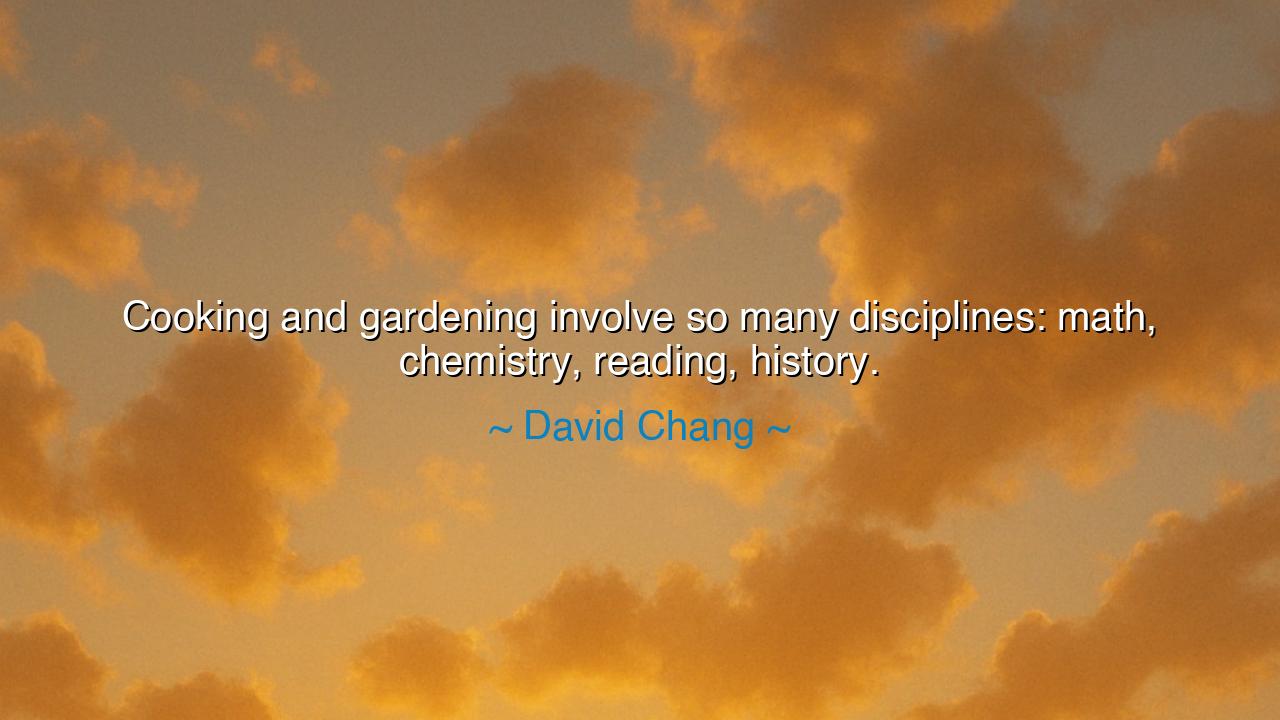
Cooking and gardening involve so many disciplines: math






The words “Cooking and gardening involve so many disciplines: math, chemistry, reading, history” were spoken by David Chang, the visionary chef and founder of Momofuku, whose creativity transformed modern cuisine. Yet in this simple statement, Chang speaks of something far greater than food — he speaks of the unity of knowledge, of how the most ordinary acts can reveal the harmony between science, art, and life itself. His words remind us that in every humble kitchen and garden lies the reflection of the cosmos: order within chaos, creation within decay, and learning woven into every act of human care.
When Chang says that cooking and gardening involve many disciplines, he unveils a truth that the ancients knew instinctively — that to cultivate the earth and transform its harvest into sustenance is both a science and a sacred art. The gardener must read the weather, measure the seasons, understand the chemistry of soil and the geometry of light. The cook, in turn, must balance heat and time, acidity and salt, turning elements into nourishment through acts of precision that echo the laws of nature. Thus, in both cooking and gardening, the human mind mirrors the divine order, using knowledge not to dominate nature, but to collaborate with it.
His mention of math recalls the proportions that govern all harmony — from the spacing of seeds in a field to the precise measurements of flour, salt, and water in bread. Math is the quiet language of creation, teaching balance and restraint. Chemistry, too, lives in the bubbling pot and the compost heap alike: the unseen transformations that turn raw into ripe, bitter into sweet, dead matter into living soil. Every gardener and cook is, knowingly or not, a student of these eternal laws — learning not through textbooks alone, but through the senses, through failure, through observation. Chang’s insight restores reverence to these practices, showing that the mind’s highest disciplines can dwell within the humblest hands.
Yet he does not stop there. By naming reading and history, Chang reminds us that these acts are also acts of memory and storytelling. Every recipe carries a lineage, every seed a history. To cook or garden is to join the great conversation of humanity — to stand among ancestors who first learned to till, to taste, to preserve. A farmer in modern Japan and a baker in ancient Egypt share, across time, the same dialogue with nature. Each harvest, each meal, each written recipe is a bridge between generations — proof that knowledge lives not only in books but in the gestures of daily life. Thus, cooking and gardening are acts of cultural remembrance, as vital to our spirit as they are to our survival.
History gives us luminous examples of this union between mind and earth. Consider George Washington Carver, born into slavery, who rose to become one of the most profound agricultural scientists in history. Through his study of soil and plants, he taught impoverished farmers the sacred reciprocity between nature and humanity. He once said, “Anything will give up its secrets if you love it enough.” Carver understood what Chang expresses — that to garden or to cook well is to think deeply, to observe patiently, to merge intellect with reverence. His fields were classrooms; his kitchen, a laboratory of love. Through such examples, we learn that wisdom does not dwell only in institutions, but in the living earth beneath our feet.
Chang’s quote also speaks to the balance between intellect and intuition. One may master the mathematics of measurement or the chemistry of fermentation, yet the greatest cooks and gardeners know there is something beyond calculation — an invisible rhythm, a spirit of creation that cannot be quantified. It is the same force that guides the painter’s brush and the poet’s pen. The mind provides knowledge, but the heart provides understanding. The union of both is what makes these disciplines sacred. To cook or garden without feeling is mechanical; to do so with both mind and spirit is divine.
The lesson, then, is that all knowledge is connected. Whether one is kneading dough, pruning vines, or balancing equations, the same truth applies: life is a web of disciplines that nourish and inform each other. The cook and the scholar, the farmer and the philosopher — they are all students of the same universe, learning through different forms the art of creation.
Practical actions: Approach your daily work — however small — with the curiosity of a student and the reverence of an artist. When you measure ingredients, see the geometry; when you plant a seed, feel the history; when you cook a meal, remember that chemistry, patience, and love are all at play. Read deeply, observe carefully, and allow your hands to become your teachers. For as David Chang reminds us, every act of creation — in kitchen or garden — is a union of intellect and wonder, a living testament to the harmony between human knowledge and the eternal wisdom of the earth.






AAdministratorAdministrator
Welcome, honored guests. Please leave a comment, we will respond soon